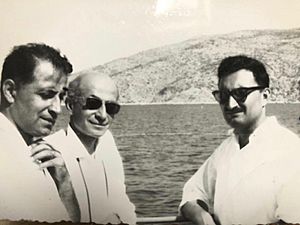Bülent Ecevit facts for kids
Quick facts for kids
Bülent Ecevit
|
|
|---|---|
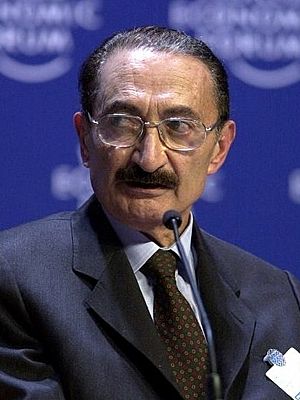
Ecevit in 2000
|
|
| 16th Prime Minister of Turkey | |
| In office 11 January 1999 – 18 November 2002 |
|
| President | Süleyman Demirel Ahmet Necdet Sezer |
| Deputy | Devlet Bahçeli Hüsamettin Özkan Şükrü Sina Gürel Mesut Yılmaz Hikmet Uluğbay |
| Preceded by | Mesut Yılmaz |
| Succeeded by | Abdullah Gül |
| In office 5 January 1978 – 12 November 1979 |
|
| President | Fahri Korutürk |
| Deputy | Orhan Eyüboğlu Turhan Feyzioğlu Hikmet Çetin Faruk Sükan |
| Preceded by | Süleyman Demirel |
| Succeeded by | Süleyman Demirel |
| In office 21 June 1977 – 21 July 1977 |
|
| President | Fahri Korutürk |
| Deputy | Orhan Eyüboğlu |
| Preceded by | Süleyman Demirel |
| Succeeded by | Süleyman Demirel |
| In office 26 January 1974 – 17 November 1974 |
|
| President | Fahri Korutürk |
| Deputy | Necmettin Erbakan |
| Preceded by | Naim Talu |
| Succeeded by | Sadi Irmak |
| Deputy Prime Minister of Turkey | |
| In office 30 June 1997 – 11 January 1999 |
|
| Prime Minister | Mesut Yılmaz |
| Served with | İsmet Sezgin |
| Preceded by | Tansu Çiller |
| Succeeded by | Hikmet Uluğbay |
| Leader of the Democratic Left Party | |
| In office 15 January 1989 – 25 July 2004 |
|
| Preceded by | Necdet Karababa (acting) |
| Succeeded by | Zeki Sezer |
| In office 13 September 1987 – 7 March 1988 |
|
| Preceded by | Rahşan Ecevit |
| Succeeded by | Necdet Karababa |
| 3rd Leader of the Republican People's Party | |
| In office 14 May 1972 – 30 October 1980 |
|
| Preceded by | İsmet İnönü |
| Succeeded by | Deniz Baykal (1992) |
| 16th Minister of Labour | |
| In office 20 November 1961 – 20 February 1965 |
|
| Preceded by | Cahit Talas |
| Succeeded by | İhsan Sabri Çağlayangil |
| Member of the Grand National Assembly | |
| In office 20 October 1991 – 18 November 2002 |
|
| Constituency | Zonguldak (1991) Istanbul (1995, 1999) |
| In office 27 October 1957 – 12 September 1980 |
|
| Constituency | Ankara (1957, 1961) Zonguldak (1965, 1969, 1973, 1977) |
| Personal details | |
| Born | 28 May 1925 Istanbul, Turkey |
| Died | 5 November 2006 (aged 81) Ankara, Turkey |
| Resting place | Turkish State Cemetery, Ankara |
| Political party | Republican People's Party (1943–1980) Democratic Left Party (1985–2006) |
| Spouse | |
| Relations | Nazlı Ecevit (mother) Fahri Ecevit (father) |
| Alma mater | Robert College School of Oriental and African Studies |
| Signature | |
| Nicknames | Karaoğlan, Halkçı Ecevit, Kıbrıs Fatihi |
Mustafa Bülent Ecevit (born May 28, 1925 – died November 5, 2006) was a famous Turkish politician. He was also a poet, writer, and journalist. Ecevit served as the Prime Minister of Turkey four times between 1974 and 2002. He led the Republican People's Party (CHP) from 1972 to 1980. Later, he became the leader of the Democratic Left Party (DSP) in 1987.
Ecevit started his political journey as a Member of Parliament (MP) in 1957. He became well-known as the Minister of Labour in the 1960s. As leader of the CHP, he made the party more appealing to working-class people. He became Prime Minister in 1974 and took a big step by leading the Cyprus operation. He served as Prime Minister two more times in the late 1970s. These years were a time of political tension in Turkey.
After a military takeover in 1980, Ecevit was not allowed to be involved in politics for ten years. During this time, his wife, Rahşan Ecevit, helped create the Democratic Left Party (DSP). When the ban was lifted in 1987, he became the DSP's leader. In 1999, while he was leading a temporary government, a major event happened: the leader of the PKK, Abdullah Öcalan, was captured. This helped his party win the election. His last government (1999–2002) brought important changes to Turkey. These changes helped Turkey move closer to joining the European Union. Ecevit stepped down as party leader in 2004 and passed away in 2006.
Bülent Ecevit is remembered as Turkey's only leftist prime minister. Under his leadership, his party received the most votes any left-wing party has ever gotten in Turkey. He helped bring social democratic ideas to Turkey. He was the last Prime Minister of Turkey before the AKP came to power.
Contents
Who was Bülent Ecevit?
His Family Background
Bülent Ecevit was born on May 28, 1925, in Istanbul. His family was middle-class. His grandfather was a scholar from a Kurdish background. Bülent's father, Fahri Ecevit, was a law professor. He also became a Member of Parliament.
Bülent's mother, Fatma Nazlı, was one of the first women in Turkey to be a professional painter. His great-grandfather on his mother's side was a religious leader in Mecca. Ecevit later donated a large inheritance from this side of his family to help Turkish pilgrims. Bülent Ecevit did not have any brothers or sisters, and he never had children of his own.
School, Writing, and Journalism
In 1944, Ecevit finished school at Robert College in Istanbul. He started working as a translator for the government. In 1946, he married his classmate, Zekiye Rahşan Aral. Soon after, they moved to London. There, he worked at the Turkish embassy. While in London, he studied different languages and art history. He also enjoyed writing Sufi poetry.
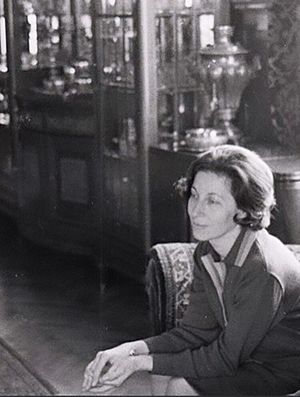
Bülent Ecevit was not just a politician. He was also a poet, journalist, and writer. In the 1950s, he worked as an editor for several newspapers. In 1955, he visited the United States as a guest journalist. He was surprised by the racism he saw there.
He returned to the US in 1957 to study social psychology and history at Harvard University. He attended talks with important figures like Olof Palme. Even when he became a politician, he kept writing for newspapers and magazines. Ecevit also translated books by famous writers into Turkish. He was successful in his writing, even though he never finished university. This fact meant he could not become the President of Turkey.
Starting His Political Journey
Bülent Ecevit came back to Turkey in 1950 and continued his work as a journalist. His writing about politics made him want to join in. In 1954, he joined the Republican People's Party (CHP). At 32, he was elected to parliament for the first time in 1957. He represented Ankara.
After a military takeover in 1960, he helped write a new constitution for Turkey. At 36, he became the Minister of Labour. He served in this role in three different governments between 1961 and 1965. During his time as Minister, a new law was passed. This law gave Turkish workers the right to go on strike and have collective bargaining.
By 1965, Ecevit was a leader of a new, younger group in the CHP. This group had left-wing ideas. He admired the Labour Party in Britain and their ideas about a welfare state. He pushed his mentor, İsmet İnönü, to adopt a new party plan called "Left of Center." He believed that democratic socialism was the best way to fight communism.
In 1969, Ecevit, as the party's secretary general, announced a plan to help villages. He used the slogan "Land for those who cultivate it, water for those who utilize it." In 1971, Ecevit resigned from his position. He did this to protest İnönü's support for the military government. He felt the military was against the "Left of Center" movement. This caused a big disagreement between them. In 1972, İsmet İnönü lost a vote of confidence to Ecevit. This made Ecevit the new leader of the CHP.
Becoming a Party Leader
Even though there was conflict, Ecevit's party initially supported the government. But he soon pulled back this support. In the 1973 presidential election, Ecevit and Süleyman Demirel agreed to support a civilian president. They voted for Fahri Korutürk.
First Time as Prime Minister (1974)
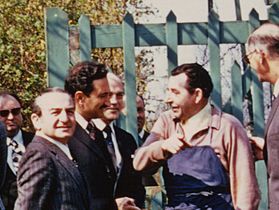
The CHP's popularity was tested in the 1973 elections. With the slogan To brighter days, the CHP won the most votes and seats in parliament. Ecevit was asked to form a government. He formed a coalition with the Islamist National Salvation Party (MSP). This party was led by Necmettin Erbakan.
His government passed a general amnesty, which meant many people were released from jail. The voting age was also lowered to 18. In July 1974, violence broke out in Cyprus. Ecevit went to London to talk with British officials. When they could not agree on a plan, Ecevit decided to send Turkish troops to Cyprus. This action led to him being called the 'Conqueror of Cyprus'. This also caused the United States to stop selling weapons to Turkey for three years.
Ecevit was a left-wing nationalist. He believed Turkey's future was not necessarily with Europe. He also applied this idea to the economy. He created social programs and increased the government's role in the economy. He also put in place high taxes on imported goods to protect Turkish businesses. His strong stance against Greece prevented Turkey from joining the European Economic Community with Greece in 1979.
Challenges and Changes
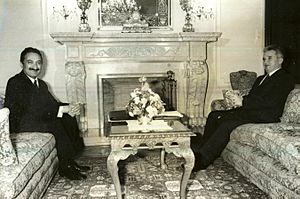
After disagreements with his coalition partner, Ecevit resigned as prime minister. He hoped to win more support in a new election. However, right-wing parties united and formed a government. During this time, Turkish politics became very divided and violent.
In the 1977 elections, the CHP won 41.38% of the votes. This was the highest percentage of votes the CHP or any left-wing party had ever received. But Ecevit did not have a majority. He formed a minority government that lasted only one month. Süleyman Demirel then became Prime Minister again.
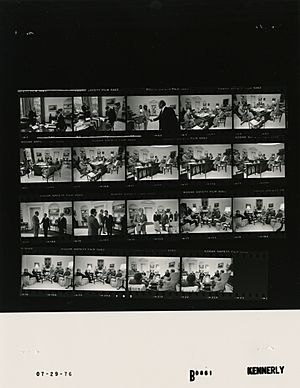
Ecevit managed to bring down Demirel's government in January 1978. He became Prime Minister for a third time. His third time as Prime Minister saw a rise in political violence. There were attacks against Alevis and CHP supporters. Ecevit suspected secret groups were behind these events. His government declared martial law in many provinces in December 1978. This included Istanbul and Ankara.
There were also claims of corruption involving Ecevit and some independent MPs. After losing in the 1979 elections, Ecevit resigned as prime minister. Demirel then governed until another military takeover in 1980.
Dangerous Moments
Bülent Ecevit faced six attempts on his life. Most of these happened in the 1970s. Five attempts were in Turkey, and one was in the United States. One famous attempt was in New York City in 1976. Another was at Çiğli Airport in 1977. In the Çiğli Airport attack, a friend of his was injured.
A Time Away from Politics
On September 12, 1980, the Turkish Armed Forces took control of Turkey. Bülent and Rahşan Ecevit, along with many other politicians, were held for a month. Ecevit was banned from politics for ten years. He resigned as the chairman of the CHP in October 1980. The military also banned the Republican People's Party and other political parties.
He was not allowed to travel abroad in 1981 because he spoke out against the military rule. He was put in prison two more times for opposing the military government. This ban did not stop Ecevit from staying involved in politics. He refused to join new parties created by former CHP supporters. Instead, his wife, Rahşan Ecevit, worked to create a new party. This was the Democratic Left Party (DSP). Bülent often spoke at DSP events as a guest. He faced lawsuits for breaking his ban on politics with his speeches.
Leading a New Party
The ban on Ecevit's political activity was finally lifted in 1987. He then became the chairman of the DSP, taking over from Rahşan. His party did not get enough votes to enter parliament in the 1987 elections. So, Ecevit briefly resigned but returned as DSP leader in 1989.
In the 1991 elections, he stressed the importance of national unity. He criticized other parties for working with pro-Kurdish groups. Even though he had some Kurdish heritage, Ecevit did not recognize Kurds as a separate ethnic group in his speeches. He opposed laws that would allow education or television in Kurdish. However, his views softened later due to pressure from Europe. Despite winning 11% of the vote, only seven DSP members entered parliament.
When the ban on the name "Republican People's Party" was lifted, there was a move to restart the CHP. Ecevit was invited to the meeting in 1992, but he did not go. He continued to keep the DSP separate from the CHP.
The DSP's luck changed after the 1995 elections. The party won 76 seats in parliament. Ecevit served as deputy prime minister for two years. In 1999, he became Prime Minister for the last time. This was before the 1999 general elections. During this time, Abdullah Öcalan, the head of the PKK, was captured. This event helped Ecevit's party win the most seats in the election. He then stayed as Prime Minister, leading a coalition government. His partners were the Motherland Party and the MHP.
His coalition partners offered to change the constitution. This would have allowed him to run for president in the 2000 election. He was not allowed to run because he did not have a university degree. Even though he was popular and parliament was willing to change the rules, he refused. Instead, he supported Ahmet Necdet Sezer for president.
His Final Time as Prime Minister
What He Did for Turkey
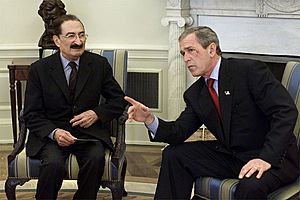
Ecevit's last time as prime minister was his longest, lasting almost four years. He worked with parties that had different ideas from his own. He was criticized for supporting business-friendly policies. His government passed many important laws. These included banking reforms and unemployment insurance. They also made the Central Bank more independent.
His government changed 34 articles of the Constitution. These changes aimed to increase basic rights and freedoms. They also made reforms to help the Turkish economy. These steps were taken to prepare Turkey for talks to join the European Union. Ecevit admitted that his past anti-EU views were a mistake. He now believed Turkey's future was with Europe. His foreign minister, İsmail Cem, helped Turkey become a candidate country for the European Union in 1999. Three major EU reform packages were passed during this government. This included ending the death penalty in 2002.
A big economic crisis happened in 2001. It was caused by long-standing problems. The value of the Lira crashed in February 2001. But two months later, the government passed many economic reforms. These reforms helped the economy grow quickly from 2002 to 2007.
The Kocaeli earthquake happened on August 17, 1999. It killed many people and caused huge damage. After this disaster, an "Earthquake tax" was created to help prevent future damage.
During this time, a law called the "Rahşan Amnesty" was passed. This law gave conditional freedom to some prisoners. It was supported by Rahşan Ecevit. She later said that she wanted to help the poor, but instead, criminals benefited.
How He Handled World Affairs
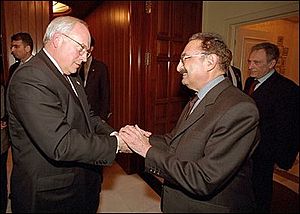
Bülent Ecevit was strongly against the invasion of Iraq by the US. However, he allowed American planes to use bases in Turkey. He also criticized American sanctions on Iraqi civilians.
Ecevit kept Turkey's close relationship with Israel. But he criticized the IDF's actions in a refugee camp. He called it "genocide," which he later said was meant for both Israel and Fatah.
His foreign minister, İsmail Cem, helped improve relations with Greece. This happened after a very difficult period between the two countries.
Health Issues and Government Changes
Rumors about Bülent Ecevit's poor health were confirmed in May 2002. He was taken to the hospital. His wife, Rahşan, later took him home when his condition worsened. She also shared her concerns about his treatment with the public.
People began to wonder if Ecevit could continue to lead the country. Some members of his party called for new leadership. In July, one of his coalition partners, Devlet Bahçeli, withdrew support. This led to many resignations from Ecevit's party. The government lost its majority in parliament. In July 2002, parliament voted to hold early elections in November.
Because of corruption claims, the economic crisis, and Ecevit's health, his party lost badly in the 2002 election. They lost all their seats in parliament. The Justice and Development Party (AKP) won a large majority. They have governed Turkey ever since. In May 2004, Ecevit announced that Zeki Sezer would be his successor. He then resigned as chairman. He left politics that summer and spent his remaining years writing.
His Final Years
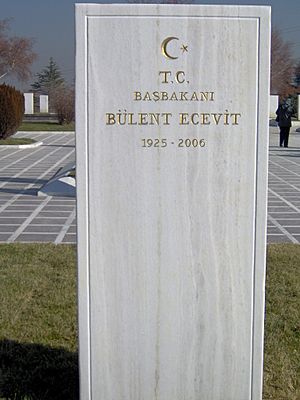
After attending a friend's funeral in May 2006, Ecevit suffered a cerebral hemorrhage. He stayed in intensive care for a long time. Bülent Ecevit passed away on November 5, 2006, due to heart and breathing problems. He had been in a coma for 172 days.
After his death, a law was passed to allow prime ministers to be buried in the Turkish State Cemetery in Ankara. This allowed Bülent to be buried there. When Rahşan passed away in 2020, parliament also voted to allow civilians to be buried there, so she could be with him.
A large state funeral was held on November 11, 2006. About a million people from Turkey and other countries attended. Five former presidents also came to the funeral.
What Was He Like?
His Special Style
Bülent Ecevit was known for his blue shirt and mariner's cap. Another thing he was known for was the dove. In his many campaign rallies, Ecevit released many doves into the air. The dove is also on the logo of his party, the DSP. He smoked certain brands of cigarettes and wrote with an Erika typewriter. He later donated his old typewriter to a museum.
Bülent and Rahşan lived a very simple and modest life. They did not have any children.
His Nicknames
Ecevit had a popular nickname, "Karaoğlan" (a Turkish folk hero). This name came from a visit to a village in Kars. A woman there hugged him and said, "Save us from these troubles, Garaoğlan!" He was also called "Halkçı Ecevit," which means "Populist Ecevit."
Süleyman Demirel, his political rival, sometimes called him "Allende-Büllende." This compared Ecevit to Salvador Allende, a socialist leader who was overthrown. Ecevit was also known as Kıbrıs Fatihi ("Conqueror of Cyprus") after the Cyprus operation. He was also called Kenya Fatihi ("Conqueror of Kenya") after the capture of Abdullah Öcalan.
Why He's Remembered
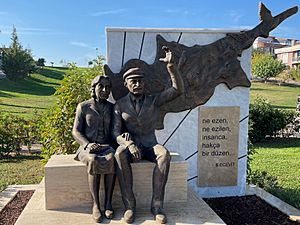
Ecevit has a special place in Turkey's political history. He was its only socialist prime minister. No Kemalist prime ministers have served since him. Under his leadership, the CHP and other left-wing parties received the highest number of votes ever in Turkey. He was the last leader of Turkey before the AKP came to power in 2002. He was also the last democratically elected CHP prime minister. Ecevit's DSP-MHP-ANAP government was the longest-lasting coalition government in Turkish history.
A cultural center in Kartal was named after him in 2005. In 2012, Zonguldak Karaelmas University changed its name to “Zonguldak Bülent Ecevit University." A wax statue of him is in a typewriter museum in Eskişehir. In 2021, a park in İzmir was named after him and his wife, and a statue was put there.
Vurgun Adalayı played Bülent Ecevit in the TV series Once Upon a Time in Cyprus.
His Books and Poems
Poetry
- Poems (1976)
- I Carved Light from Stone (1978)
- We Grew Love Hand in Hand (1997)
- Something Will Happen Tomorrow (2005)
Books
- Left of Center (1966)
- This Order Must Change (1968)
- Atatürk and Revolutionism (1970)
- Congresses and After (1972)
- Democratic Left and Government Crisis (1974)
- Basic Concepts and Problems in Democratic Left (1975)
- Foreign Policy (1975)
- World-Turkey-Nationalism (1975)
- Society-Politics-Administration (1975)
- Worker-Peasant Hand in Hand (1976)
- Turkey / 1965–1975 (1976)
- Year of Hope: 1977 (1977)
See also
 In Spanish: Bülent Ecevit para niños
In Spanish: Bülent Ecevit para niños
 | James Van Der Zee |
 | Alma Thomas |
 | Ellis Wilson |
 | Margaret Taylor-Burroughs |


